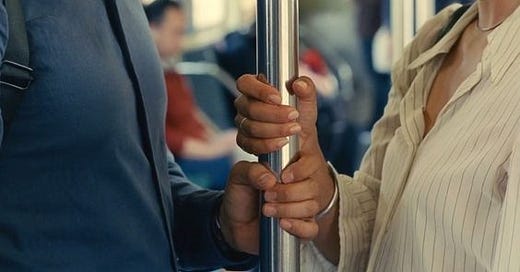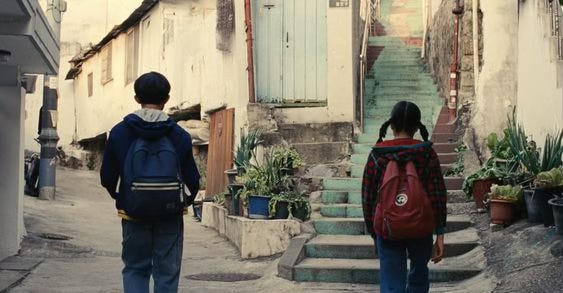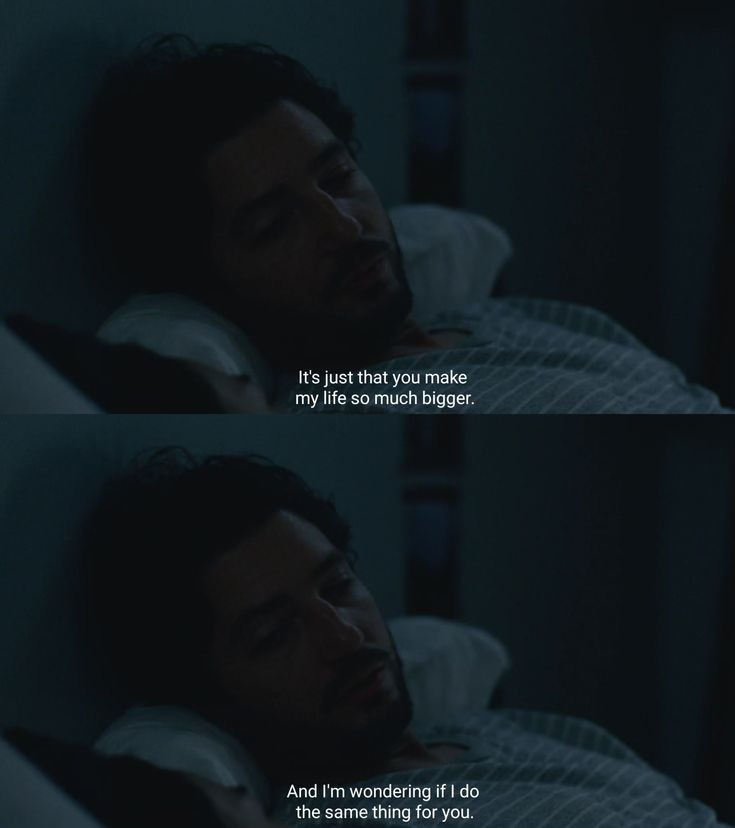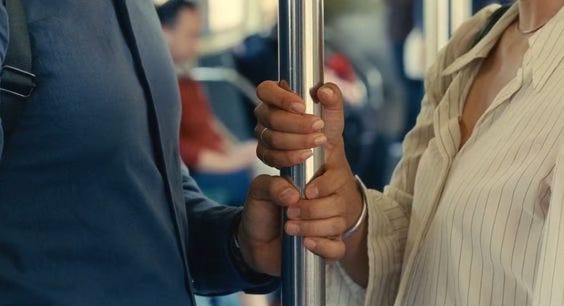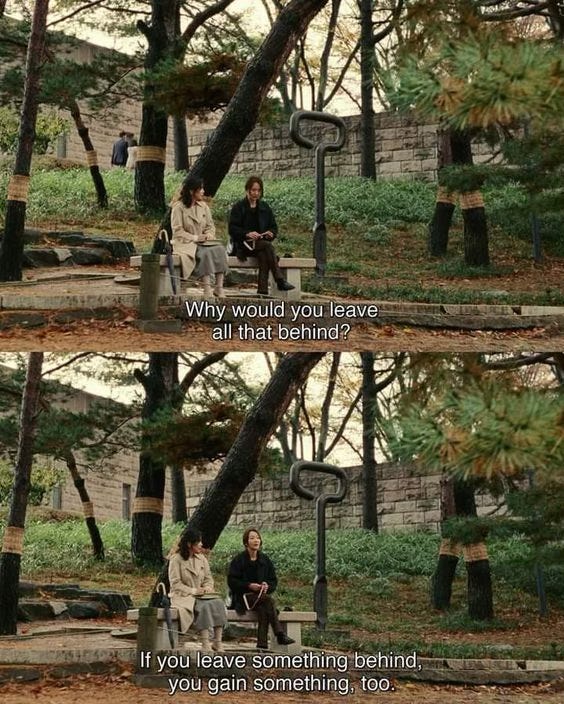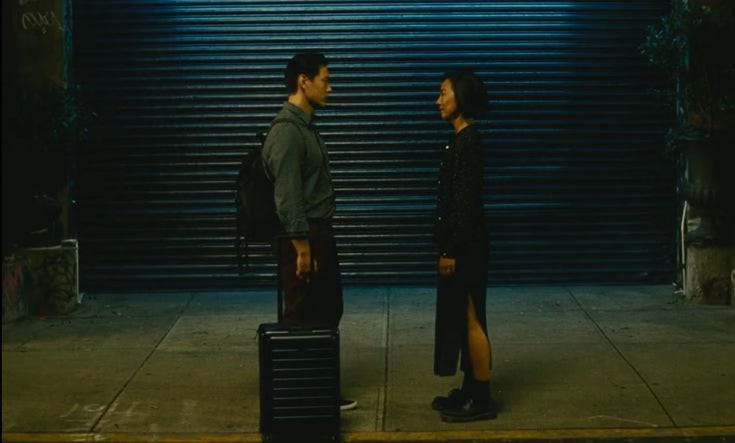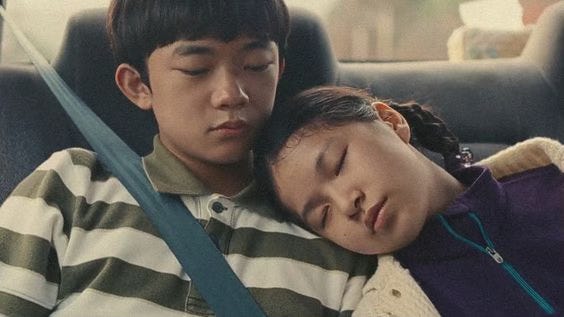Clarity On Love and Loss After Seeing 'Past Lives'
The most I've ever felt in 1 hour and 46 minutes.
Paragraph One: Childhood Loss
In the moment, being young seems so simple, but looking back on it is like another lifetime; it appears as this Sisyphean task. You’re in a loop; you both know the least you’ll ever really know in your lifetime, but with each passing day you also know more than you ever have before. You don’t take anything too seriously, because consequences are something you’ve yet to get used to. In a similar way to how Hae Sung and Na Young are able to part ways as children with so little fuss and expression of emotion, I recall making vacation friends as a young girl before my brother was born; being able to confidently bid them farewell, knowing we’d never meet again. There is one girl I remember every now and then from a beach in Lanzarote. We had no swimsuits, but still went out so far in our clothes our parents were waving us back out of worry. She told me about her home in Brazil, and that’s about as much of our conversation as I can remember. Though I can guarantee our parting was neither as heartbreaking nor life altering as the two main characters in ‘Past Lives’, I wonder what she’s doing today; if she remembers me, and if there could ever be any possible way of our paths crossing once again. I don’t think I could do that as an adult - spend an entire day with someone with the knowledge I won’t ever see them again, whether we have a great time or not. That’s the gift and yet simultaneous curse of being a child, the ability to take things as they come, with full surrender. You do not yet know life in all its volume.
Nora: The Na Young you remember... doesn't exist here.
Hae Sung: I know.
Nora: But... that little girl did exist. She's not sitting here in front of you... but it doesn't mean she's not real. Twenty years ago, I left her behind with you.
Hae Sung: I know. And even though I was only twelve, I loved her.
Paragraph Two: What I Cannot Give You
Nora and Arthur’s relationship was, sadly, painfully familiar to me. Every conversation they had was taken straight from visions I had once had of how my past relationship was sure to end up. Or worse, conversations once had. I found it clever how Celine Song actually made him address the complications of their situation as if they were actually living a story:
“In the story, I would be the evil white American husband standing in the way of destiny.”
In truth, Arthur was in no way a ‘bad guy’. In fact, I can’t imagine how painful it would be, watching your wife and her childhood sweetheart sit beside you in a bar with their backs turned, speaking a language you can’t understand. To then see her in pieces when he leaves, comforting her as best you can, but feeling helpless and confused and momentarily discarded. It’s possible I’m overcompensating; feeling more sympathy for him than Song intended. It’s because I’ve met an Arthur before, and I’ve been the Nora who caused his pain and confusion. Though it wasn’t in the context of a near-love triangle - more just me being young, inexperienced and confused - these conversations were just as hard. Knowing somebody loves or just cares about you, something you’ve always wanted and now have but can’t fully comprehend, is big and moving. Being hesitant and uncertain about your feelings is so frustrating when you still have some kind of love for them too… But, funnily enough, they can always tell. It broke my heart to hear Nora’s response to her husband asking if she’s happy with their life together:
“This is where I ended up. This is where I’m supposed to be.”
She doesn’t sugar coat it. It’s as if fate has forced her his way and she is simply compliant, never actively choosing him or anything over the strength of the currant. You may hear it differently. Maybe I take this view because I have once laid by someone’s side and told them I was completely happy, when really I wasn’t sure. And I wasn’t sad, so being happy - the default for someone in love - seemed like the right word. Little did I know, if you’re so much as searching for another one, that’s your clue. Sometimes you won’t know how you got so lucky, and concomitantly, you won’t know why you feel like such a fraud. Don’t push it down, away from them and yourself. You both deserve so much more.
Paragraph Three: We’re In Love. We Could Do Anything We Want.
Often when I’m out doing something creative (seeing a movie, at a museum or a concert…) inspiration will strike at any given moment, and I will race to my notes app to jot down a feeling that a certain film or painting or song evokes. This sentence: ‘we’re in love, we could do anything we want,’ came to me mid-watching ‘Past Lives’. I wrote it down with a view to explaining it in this piece.
In the middle section of the film, when Hae Sung arrives in New York and spends his first day with Nora since they were children, they take up the entire day roaming the city freely. The moment they lock eyes across the fountain, you feel the anticipation for what might be said. Nora walks over: “Whoa, it’s you.” Hae Sung stands searching for words, until she reaches out to embrace him. It cuts to a clip we saw earlier, of them as children, playing on a statue in the park. With this simple momentary flashback, it sinks in just how long that time is to have spent apart. You register the enormity of this moment for them both; for anyone who’s been in this position. You realise that after waiting so long for somebody so important, what else could matter? Being in love to the point of spiritual, deep connection is a true gift, and as I felt myself craving it in the same way I was seeing it on screen, I realised how romantic love must be so uplifting and freeing, surely you’d forget to think about anything else.
Paragraph Four: Closure
At the start of a movie, I try not to look for clues or indications of what may happen later on, or maybe I just forget. Though the conversation between Hae Sung and Na Young’s mothers in this scene is very brief, don’t let that undermine its significance. When you look back at the words spoken here once the film is over, they mean so much more.
“If you leave something behind, you gain something, too.”
It comes full circle, the theme of simultaneous escape and attainment.
“…Koreans don’t win the Nobel Prize for Literature.”
Nora’s immigration broadens her horizons, until eventually she becomes a writer and critic in New York. She leaves again for her retreat, only to meet her future husband Arthur. Hae Sung leaves Seoul to meet Nora in New York, and both their feelings rise to the surface with the more time they spend together. As he finally leaves her and the city behind, she gets clarity on her feelings as it all comes crashing down once his car has pulled away.
The things we ‘gain’ from leaving something or someone else behind may not always be, or feel like, rewards. They may be upsetting and emotional, but enlightening, too.
The gain is the first step in closure, whether it comes seconds or years after the leaving.
Paragraph Five: In-Yun
I heard Greta Lee explaining the concept of in-yun on the Graham Norton Show months before I actually ended up seeing the film. I don’t think I gathered at the time how beautiful a presentation of the term this movie would be. No description can come close to a physical 1 hour and 46 minute demonstration of a connection that extends past one lifetime.
In a clip promoting the movie, Lee explains that it’s all a question of ‘is this timing? Or something greater than that?’ When you think about all the years that have passed up until 2024, and all the years that are yet to come, combined with the coexistence of parallel universes (if you believe in that) and all the potential places our souls could have landed and made a home in, you realise the odds of you ending up where you are now. With these people, in this home, with these friends, with this job, in this city, at this exact time…
The old Korean proverb is the belief that nothing happens by accident, not even brushing past a stranger on the street. You and that person have in-yun. If you have shared energy in a past life, it is translating into this one. While I find that is a lot to think about, it doesn’t seem nonsensical. It’s also comforting because, during times where I fear another person’s authority or power, I can realise that we’re simply souls that are naturally inclined, and come from the same place. If I’m in an audition room and my potential next job is in a thirty-something year old casting director’s hands, my head starts to crowd with overwhelming thoughts. This person feels so superior to me; they can determine my future; they could ruin my life if they wanted to. But shifting my perspective in this context, or any, and simply seeing us as two people whose lives have crossed paths in this life, and maybe others… It breaks us down to our simplest form, without judgement and hierarchy.
“Maybe that capacity for love is much more boundless than we ever knew.” “…how completely overwhelming and beautiful [is that discovery?]” - Greta Lee
We hear the phrase ‘maybe in another lifetime’ a lot, regarding romantic love in particular. To me, hearing it is a punch to the gut. How painful to choose to depend on the fact that there will be another lifetime where you meet, and lose all chance at happiness in this one because the variables didn’t work in your favour…
Though I can’t say the idea is any less painful after watching ‘Past Lives’, I think I understand the reasoning for it now. The phrase offers consolation during times when you feel you’ve lost too much, and can’t face the idea of letting it go. You can hold onto the possibility that one day you’ll get it, even if you’re not conscious you couldn’t have it once in the past. It reminds me of a beautiful lyric by The Japanese House from their song ‘Sad To Breathe’:
I forget
I can’t tell if the things I have, I just don’t want
Or the things I want I just don’t get
In-yun seems like a concept that encourages gratitude or hope when you’re caught up in the present moment. The amount of work it’s taken in all your past lives to get you to where you are now is beyond our understanding. It’s said that those who marry have experienced 8,000 layers of in-yun across 8,000 lifetimes. When I think about how I’ve ended up with the family I have; the friends I’ve met, it makes me want to work harder at these relationships. Though I may see or know them in another lifetime, we may never be as close as we are now.
Epilogue:
All I have left to comment on is this beautiful parallel I only just noticed after re-watching the movie for this piece.
We see Hae Sung sit in the backseat of the car as a child, with Na Young sleeping on his shoulder. As the car moves out of frame, he gazes into the distance, and as far as we are concerned it is the last intimate day they spend together before she leaves to immigrate.
At the end of the movie, Hae Sung steps into his Uber and bids Nora goodbye. Just like the characters themselves, we’re not sure if they’ll ever see one another again. The credits roll after we see a shot of him in the back of the cab, this time looking out across the bridge in New York.
Nora explains earlier on in the bar that she left her younger self, ‘Na Young’, with Hae Sung, almost as if it were a separate lifetime. It’s a sad yet poetic image if we split up their childhood and adolescence into two separate lifetimes. One, together in that car, the other, with him alone as he drives away from her and her husband.


